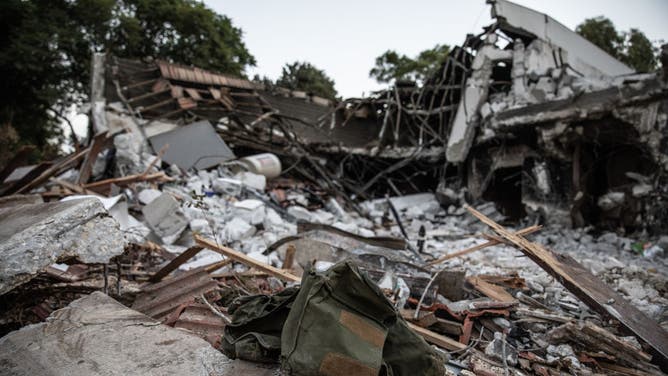Consequences For Israel-Hating College Kids Is Not Cancel Culture, But It’s Complicated: Mary Katharine Ham
In the wake of horrendous terrorist attacks in Israel which took the lives of more than 1,400 civilians and rising, student groups at America’s elite universities came together to make excuses for the bloody pogroms.
Ryna Workman, head of the New York Law Student Bar Association is emblematic of the stomach-turning response.
"This week, I want to express first and foremost, my unwavering and absolute solidarity with Palestinians in their resistance against oppression toward liberation and self-determination. Israel bears full responsibility for this tremendous loss of life."
Workman lost a job offer at a top-tier law firm, as her would-be employers said her "comments profoundly conflict with Winston & Strawn’s values as a firm."
In the wake of other such statements, including one by a group of 30+ Harvard student groups that held the "Israeli regime… entirely responsible for all unfolding violence," some called for students to face similar consequences. Billionaire hedge-funder Bill Ackman wrote on social media that he’d like to know who was in each of these student groups, so as not to "inadvertently hire any of their members."
Others have called such proclamations cancel culture run amok once again, dinging right-leaning commentators for alleged hypocrisy on the subject.

ISRAEL - OCTOBER 11: A view of a destroyed building after Hamas launched Operation Al-Aqsa Flood in Israel on October 11, 2023. (Photo by Mostafa Alkharouf/Anadolu via Getty Images)
I care deeply about free speech, and am pretty close to an absolutist for what is permissible for adults in this country. Those whose views are outrageous and disgusting must be included in these protections or what’s the point? It’s easy to stand up for speech you like, but necessary to stand up for speech you hate, even when it fits the definition of hate speech, which many of these demonstrations include. Hate speech is free speech.
Now, to the question of consequences.
Cancel culture has always been a question of degree. Critique of it doesn’t mean all consequences for speech cease to exist. This makes the standard subjective, and some are bound to change it conveniently based on their leanings. But we’ve always had consequences for speech. The reason we needed a name for cancel culture is that it became something new, more operationalized and unforgiving.
Cancel Culture Is Still Relatively New
As Greg Lukianoff, author of the new "Canceling of the American Mind," notes, the uptick in this new phenomenon began in 2014, most intensely on campus. Data now shows, "90% of surveyed professors say they have self-censored out of fear. During the height of McCarthyism in the 1950s, only 9% of professors did the same."
Cancel culture lacks three things: perspective on the offense, proportion in the response, and a path to redemption.
Let’s talk about perspective first. In recent years, a man lost his job for putting an "OK" symbol out his car window in traffic. This was deemed to be a white-nationalist-aligned signal and the Hispanic American was fired by a public utility. There was a national news cycle because Heisman Trophy winner Kyler Murray used the word "queer" in tweets when he was 15-years-old. Chris Harrison, a 20-season veteran host of "The Bachelor," was canceled for merely declining to cancel a Bachelor contestant hard enough because she wore a problematically antebellum costume at a fraternity party.
These alleged offenses are not, by any stretch of the imagination, such extreme rhetoric as to deserve this kind of attention and punishment. But mobs often lack perspective. In cancel culture at its worst, employers, corporations, the public, and media pile on these relatively minor offenses to avoid being "complicit" in whatever -ism has been attached to the alleged offense. Silence is violence, as they say.
On the other hand, a published statement excusing, even applauding, the largest mass murder of Jews since the Holocaust, on behalf of a literal terrorist organization, probably qualifies as rhetoric that warrants consequences. Beyond college, some have lost jobs the past two weeks for applauding the terrorist attacks: One ER doc called it "Zionist settlers getting a taste of their own medicine." An Air Canada pilot was fired for posting pictures of himself at a protest carrying "holding a sign that made reference to Hitler: ‘Keep the world clean.’"
I’d like college students to have a lot of leeway for dumb, wrong, even detestable speech without missteps ruining their lives. But to have one’s 6-figure job prospects curtailed for attending what is analogous to a Klan rally on campus is what we had before cancel culture— a recognition that the most extreme speech is to be free but not encouraged while people can make smaller mistakes uncanceled.
Now, let’s talk about proportion. This is where I differ from some on my side who say that every single student in every one of these organizations and rallies should be named and shamed. Some have already spoken out, said they were unaware of and appalled by these statements, and resigned. Governance of student groups is not famously competent, and some almost certainly had no process by which to get a statement approved. Holding leadership of those groups accountable more than rank-and-file seems appropriate and looks to be what’s happening.
These leaders understood they could say whatever they wanted and retain the moral high ground, as long as their outrageous speech was left-aligned, because that is what college taught them. I want them to now learn that cheering the wanton murder of civilians, at the very least, won’t improve their job prospects.

NEW YORK, UNITED STATES - OCTOBER 08: Supporters of Israel and supporters of Palestinians hold demonstrations at the same time at Times Square in New York, United States on October 08, 2023. (Photo by Fatih Aktas/Anadolu Agency via Getty Images)
Which leads me to a path to redemption. There are some who say these "children" are adults. That is true and they should be treated as such, no matter how infantile their GoFundMe pitches. There are some who say they can’t be redeemed, that if you were dumb enough to be part of these organizations, you played footsie with this ideology and you get what you deserve.
But I want to give these college students the chance to look around at their fellow travelers and say "Wow, I did not know exactly what I signed on for." I want to give people a chance to come back from the brink, to notice that embracing oppressor vs oppressed ideology has left them without a sense of right and wrong. Are all of the students who have distanced themselves sincere? Probably not. Have they been willfully blind to what they were enabling by signing on to the bully caucus as part of a protection racket on campus? Sure. But I don’t want to discount the possibility they can change, either.
There are literal Klansmen and terrorists who come back after falling off the moral precipice, so it seems unwise to assume college students cannot. Though after watching college students in action since October 7th, I understand the lack of confidence.